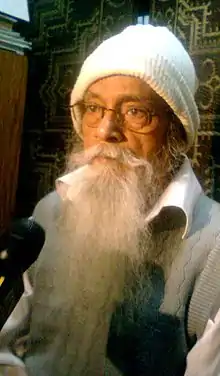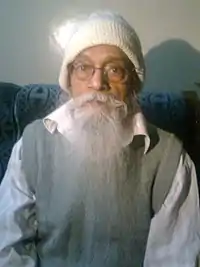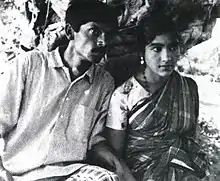Subhash Dutta
Subhash Dutta (9 February 1930 – 16 November 2012) was a Bangladeshi filmmaker, theater and film actor. He started his career as a commercial artist.[4]
Subhash Dutta | |
|---|---|
সুভাষ দত্ত | |
 Dutta, during a TV interview in 2012 | |
| Born | 9 February 1930[1] |
| Died | 16 November 2012 (aged 82)[2] Dhaka, Bangladesh |
| Nationality | Bangladeshi |
| Occupation(s) | Filmmaker, actor, designer |
| Spouse | Shima Dutta (–2001; widower)[3] |
| Awards | National Film Awards (1977) Ekushey Padak (1999) |
Career
At the beginning of his career, Dutta worked as a film poster artist. He drew posters for Mukh O Mukhosh (1956), the first Bengali-language movie to be made in East Pakistan (now Bangladesh). He directed his first movie, Sutorang, in 1964.[4] The movie won the second prize at the Frankfurt Festival in 1965.[4] In 1972, he acted with the theatrical group, Aranyak Nattyadal.[4]
Awards

- Bangladesh National Film Award for Best Director (1976)
- Ekushey Padak (1999)[5]
- Nigar Award (1962)[6]
His movie Abirbhab won a prestigious award in Frankfurt Film Festival.[2] His directed movies were awarded in Phnom Penh Film Festival (1968), Moscow Film Festival (1967, 1973, 1979). He also got award for his acting by Pakistan Film Festival (1965).[4]
Personal life and death
Dutta had two sons, Shivaji and Ranaji, and two daughters, Shilpi and Shotabdi.[4]
Dutta died from heart disease on 16 November 2012 at his home in Ram Krishna Mission Road, Dhaka.[2][5]
Filmography
- Director
- Sutorang (1964)[7]
- Aina Obo Shishta (1966)[8]
- Kagazer Nouka (1966)[8]
- Abirbhab (1968)[9]
- Alingan (1969)[10]
- Pala Bodal (1969)[10]
- Binimoy (1970)[11]
- Akankha (1976)
- Arunodoyer Agnishakkhi (1972)[11]
- Bashundhara (1977)[11]
- Dumurer Phul (1978)[11]
- Sabujsathi (1982)
- Nazma (1983)
- Sakal Sandha (1984)[11]
- Phulshajya[11]
- Abdaar
- Swami-Stri (1987)
- O Aamar Chhele (2008)[11]
- Actor
- Ei Desh Tomar Amar (1959)[2]
- Harano Din (1961)[12]
- Rajdhanir Buke (1961)[12]
- Chanda (1962)[12]
- Notun Sur (1962)[13]
- Surja Snan (1962)[12][14][15]
- Talash (1963)[13]
- Milan (1964)[16]
- Paisay (1964)[16]
- Sutorang (1964)[7]
- Aakhri Station (1965)[17]
- Kaise Kahun (1965)[17]
- Kajal (1965)[7]
- Nadi-o-Nari (1965)[17]
- Rupban (1965)[17]
- Saagar (1965)[7]
- Aina Obo Shishta (1966)[8]
- Phir Milinge Hum Dono (1966)[18]
- Abirbhab (1968)[9]
- Alingan (1969)[10]
- Pala Bodal (1969)[10]
- Chalo Maan Gayai (1970)[19]
- Kolkata 71
- Noya Micchil
- Ayna (2004)[4]
- O Amar Chhele (2006)
References
Footnotes
- "Subash Dutta is no longer alive". Prothom Alo. 2012-11-16. Archived from the original on 2012-11-18. Retrieved 2012-11-16.
- "Subhash passes away". The Daily Star. 2012-11-16. Retrieved 2012-11-16.
- "Subhash Dutta cremated". bdnews24.com. Archived from the original on 2012-11-20. Retrieved 2012-11-17.
- "Chole gelen Subhash Dutt". Prothom Alo. Retrieved 2012-11-17.
- "Filmmaker Subhash Dutta no more". bdnews24.com. 2012-11-16. Archived from the original on 2012-11-20. Retrieved 2012-11-16.
- "Nigar Award 1962: 19 September, 1963 Hotel Metropol Karachi". Retrieved 14 April 2013.
- Gazdar 1997, p. 254
- Gazdar 1997, p. 257
- Gazdar 1997, p. 262
- Gazdar 1997, p. 265
- Hasan, Khalid (22 February 2018). "Subhash Dutta: The Visual Storyteller". The Daily Observer. Dhaka.
- Gazdar 1997, p. 250
- Gazdar 1997, p. 251
- Raju 2002, p. 11: "Slahuddin's Sunbath (Surjosnan, 1962)"
- Shikdar 2004, p. 110: "১৯৬২ সূর্য স্নান - সালাউদ্দিন [1962 ... Surja Snan - Salahuddin]"
- Gazdar 1997, p. 253
- Gazdar 1997, p. 255
- Gazdar 1997, p. 256
- Gazdar 1997, p. 267
Bibliography
- Gazdar, Mushtaq (1997). Pakistan Cinema, 1947-1997. Oxford University Press. ISBN 0-19-577817-0.
- Raju, Zakir Hossain (2002). "Bangladesh: A Defiant Survivor". In Vasudev, Aruna; Padgaonkar, Latika; Doraiswamy, Rashmi (eds.). Being & Becoming: The Cinemas of Asia. MacMillan. ISBN 0333-93820-8.
- Shikdar, Abdul Hai (2004). বাংলাদেশের চলচ্চিত্র, ইতিহাসের এক অধ্যায় [Cinema of Bangladesh, a section of history]. Dhaka: Himi Books & Books. ISBN 984-8336-42-7.
